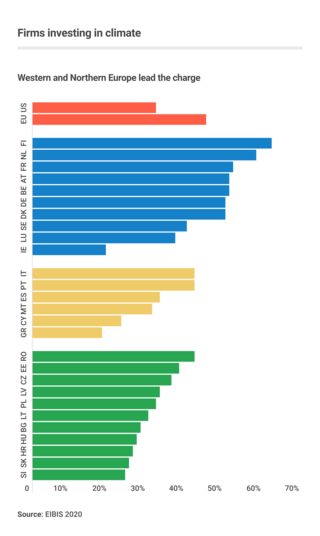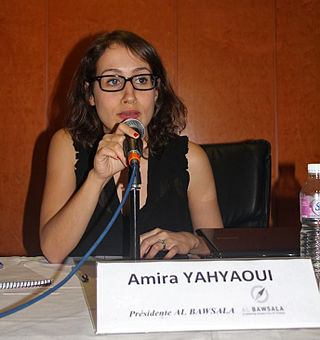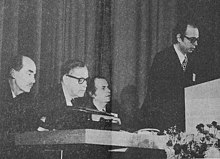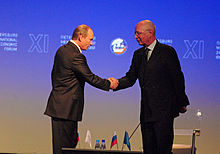
Switzerland, officially the Swiss Confederation, is a landlocked country located in west-central Europe. It is bordered by Italy to the south, France to the west, Germany to the north and Austria and Liechtenstein to the east. Switzerland is geographically divided among the Swiss Plateau, the Alps and the Jura; the Alps occupy the greater part of the territory, whereas most of the country's population of 9 million are concentrated on the plateau, which hosts its largest cities and economic centres, including Zurich, Geneva, and Basel.

The World Economic Forum (WEF) is an international non-governmental organization, think tank, and lobbying organisation based in Cologny, Canton of Geneva, Switzerland. It was founded on 24 January 1971 by German engineer Klaus Schwab.

José María Figueres Olsen is a Costa Rican businessman and politician, who served as President of Costa Rica from 1994 to 1998. He also ran for president in the 2022 presidential election but was defeated by Rodrigo Chaves.

Business action on climate change is a topic which since 2000 includes a range of activities relating to climate change, and to influencing political decisions on climate change-related regulation, such as the Kyoto Protocol. Major multinationals have played and to some extent continue to play a significant role in the politics of climate change, especially in the United States, through lobbying of government and funding of climate change deniers. Business also plays a key role in the mitigation of climate change, through decisions to invest in researching and implementing new energy technologies and energy efficiency measures.

The Kaunas University of Technology is a public research university located in Kaunas, Lithuania. Established in 1922, KTU has been seen as one of Lithuania's top science education centers. KTU was the second-best university in Lithuania.

Manuela Kasper-Claridge is a German journalist.
Security convergence refers to the convergence of two historically distinct security functions – physical security and information security – within enterprises; both are integral parts of a coherent risk management program. Security convergence is motivated by the recognition that corporate assets are increasingly information-based. In the past, physical assets demanded the bulk of protection efforts, whereas information assets are demanding increasing attention. Although generally used in relation to cyber-physical convergence, security convergence can also refer to the convergence of security with related risk and resilience disciplines, including business continuity planning and emergency management. Security convergence is often referred to as 'converged security'.

Russia–Switzerland relations are foreign relations between Russia and Switzerland. Switzerland opened a consulate in Saint Petersburg in 1816, upgrading it to a legation 90 years later. The two countries broke off diplomatic relations in 1923, when Russia was going through a period of revolutionary turmoil – and they were not resumed until 1946. Due to the Russian invasion of Ukraine, relations became tense after Switzerland imposed sanctions against Russia. Russia placed Switzerland on a list of "unfriendly countries".
Forum of Young Global Leaders, or Young Global Leaders (YGL) is a non-profit organization. It was created by Klaus Schwab, founder of the World Economic Forum and is managed from Geneva, Switzerland, under the supervision of the Swiss government. It is run by the World Economic Forum.
WORLD.MINDS is a non-profit foundation set up in June 2008 by Rolf Dobelli, with the goal of creating "a bridge between the science, business and cultural communities".
The Public Eye on Davos, held every year between 2000 and 2015, was a counter-event to the annual meeting of the World Economic Forum in Davos.

A technological revolution is a period in which one or more technologies is replaced by another novel technology in a short amount of time. It is a time of accelerated technological progress characterized by innovations whose rapid application and diffusion typically cause an abrupt change in society.

Peter Maurer is a Swiss diplomat who was the President of the International Committee of the Red Cross (ICRC) from 1 July 2012 until October 2022 and is currently President of the Basel Institute on Governance.
Multistakeholder governance is a practice of governance that employs bringing multiple stakeholders together to participate in dialogue, decision making, and implementation of responses to jointly perceived problems. The principle behind such a structure is that if enough input is provided by multiple types of actors involved in a question, the eventual consensual decision gains more legitimacy, and can be more effectively implemented than a traditional state-based response. While the evolution of multistakeholder governance is occurring principally at the international level, public-private partnerships (PPPs) are domestic analogues.

Renat Heuberger is the co-founder and Senior Adviser of South Pole, a carbon finance consultancy. He was CEO until resigning on 10 November, 2023. He has been engaged as a social entrepreneur in the fields of sustainability, climate change and renewable energies since 1999.

"Fourth Industrial Revolution", "4IR", or "Industry 4.0" is a buzzword and neologism describing rapid technological advancement in the 21st century. The term was popularised in 2016 by Klaus Schwab, the World Economic Forum founder and executive chairman, who says that the changes show a significant shift in industrial capitalism.

Public Eye is a sustainability-oriented, politically and religiously independent solidarity development non-governmental organisation based in Switzerland.

Amira Yahyaoui is a Tunisian entrepreneur, blogger and human rights activist. She was previously the Founder and President of Al Bawsala, a multi-awarded transparency and accountability NGO.
Work 4.0 is the conceptual umbrella under which the future of work is discussed in Germany and, to some extent, within the European Union. It describes how the world of work may change until 2030 and beyond in response to the developments associated with Industry 4.0, including widespread digitalization. The concept was first introduced in November 2015 by the German Federal Ministry of Labour and Social Affairs (BMAS) when it launched a report entitled Re-Imagining Work: Green Paper Work 4.0. It has since then been taken up by trade unions such as the DGB and various employers' and industry association such as the VDMA and the BDA. At the global level, similar topics are addressed by the World Bank's 2019 World Development Report The Changing Nature of Work and ILO's Future of Work Centenary Initiative.
The Great Reset Initiative is an economic recovery plan drawn up by the World Economic Forum (WEF) in response to the COVID-19 pandemic. The project was launched in June 2020, and a video featuring the then-Prince of Wales Charles was released to mark its launch. The initiative's stated aim is to facilitate rebuilding from the global COVID-19 crisis in a way that prioritizes sustainable development.















